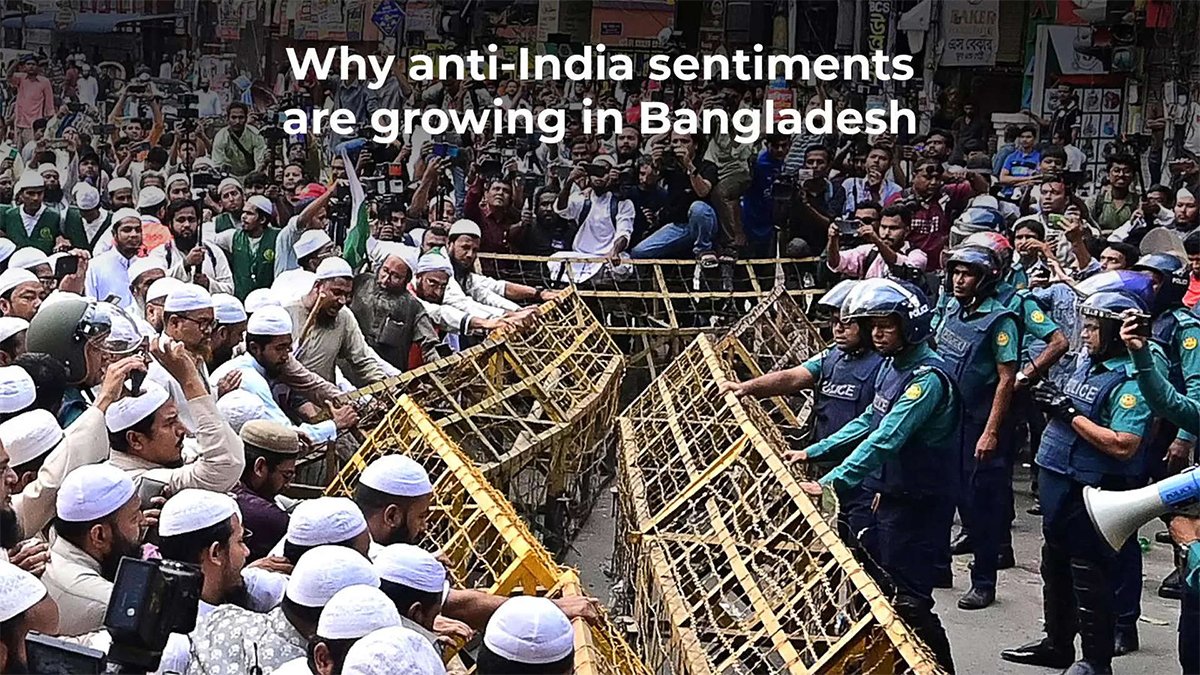by Pinaki Chakraborty
Over the past month or so, Bangladesh has witnessed multiple protests by the opposition Bangladesh Nationalist Party (BNP) demanding a neutral caretaker government ahead of the upcoming national election. This has led to scores of BNP workers and leaders being arrested by the police.
Even the US has repeatedly stressed the need for a peaceful, free and fair election process in the South Asian nation, fuelling speculation of a potential sanction on the Sheikh Hasina government.
Earlier this year, the US State Department announced a visa curb on any “Bangladeshi individual, believed to be responsible for, or complicit in, undermining the democratic election process in Bangladesh”.
TOI Plus spoke to Mohiuddin Ahmad, a Bangladeshi writer and political historiographer, who shared his views on the current political situation in the country and its potential implications.
Q: How do you read the current political situation in Bangladesh?
A: It is a stalemate because both sides are quite adamant about their demands and are not budging.
For both the parties it is a serious issue of survival. The party which is in power feels that if there is a free election, they will lose.
The other party thinks that if there is an election under the present regime, they are destined to lose it. That’s why they are demanding elections under a neutral government.
Whoever concedes, it will be suicidal for them.
Q: Do you think anyone will concede?
A: So far, I don’t see a possibility of that happening. But, the ruling party has an advantage because they are powerful and have the state machinery at their disposal.
It is obvious that the state machinery, particularly the bureaucracy, police, and business community support the regime.
The situation is tough for any party in the opposition, unless a mass uprising is created where millions of people come out and face the police.
The main alternative to the Awami League is the BNP, but behaviourally when they are in power, they do things that they criticise when they’re in the opposition.
Q: With international pressure mounting on Sheikh Hasina to conduct a free and fair election, where does it leave the PM?
A: The international pressure is actually led by the US, particularly with visa sanctions; economic sanctions may follow.
The problem is, this is going to harm people, and not the regime. Also, the current political programmes of the Opposition will be harmed.
For power, Sheikh Hasina may take any course and though we do not know, there may be some dealings with the US.
The US is not a champion of democracy or human rights, but they can have a decisive say.
Q: The US is the biggest market for Bangladeshi garments. How hard would it be for Dhaka if they impose sanctions?
A: It will have a serious impact on the economy because whatever steps Washington DC takes, it is likely to be followed by Canada, Australia and Europe.
Bangladesh has a trade surplus with the US and the European Union. The economy will really suffer if there are sanctions.
If there is some turmoil in the business community and the army, which we experienced in 2006-07, then the situation may take a sharp turn.
Q: What are the issues affecting the Sheikh Hasina government?
A: She [Hasina] seems to be quite comfortable, without showing any signs of weakness. She thinks she is in trouble, which is evident from what she’s saying in public.
Like in 2014, she has already announced the election schedule unilaterally. Back then, the Opposition had a big campaign with lots of hartals and blockades for a year, but the Hasina government survived and completed its term.
It is a question that many are asking: the BNP strategy did not succeed in 2014, why would it succeed now?
The balance of power may be affected by international pressure, but the regime will consider to what extent… The main concern of the regime is power and not the welfare of the people.
Q: With most leaders of the BNP behind bars, are there any parties that will actually contest the elections?
A: There are many parties that are contesting. But, they are not capable of winning the election and forming the government. So what they’re going to do is go for seat sharing with the Awami League.
In this way, the ruling party is trying to engage a few so-called opposition parties. It is also trying to divide the main opposition and is alluring some of the leaders from the opposition to become MPs using other election symbols.
Q: Is there a chance of the election being postponed?
A: Look, anything may happen because the situation is so uncertain. We do not know what is happening behind the scenes between Bangladeshi leaders and those of the US, Europe, India and China.
The elections [due in January next year] may be postponed for a few weeks, but not for an indefinite period because there is a constitutional compulsion, unless a state of emergency is declared.
In past elections, the voter turnout was very low. In a recent bypoll, the voter turnout was 8% . I expect a low turnout and if the votes are counted properly, it won’t exceed 15-20%.
People in Bangladesh want a free and fair election and there are lots of people who are fed up with the current government. After 15 years, they want a change in regime. If a free, and fair, election is conducted, there is a possibility of regime change.
Q: Why is Sheikh Hasina so reluctant to appoint an interim government?
A: Hasina knows that once she is out of power, she will be nowhere. She feels threatened.
There was a constitutional provision for an interim government for three months leading into the polls, which she removed.
She thinks that if there is an election under a neutral government, she may not have a chance to come back to power.
Q: The Awami League has accused the BNP of being a non-democratic party…
A: Whenever a party is in power in Bangladesh, they behave like a dictatorial and authoritarian government.
The moment these parties become the opposition, they become champions of democracy. This is applicable to both the Awami League and the BNP.
It is not just an authoritarian government, it is one which is ruled by a family.
Q: How important is the Hasina government for countries like India?
A: The relationship between Bangladesh and India has seen many ups and downs since 1971.
Bangladesh has not learnt how to coexist with a big and powerful neighbour like India, while New Delhi has not learnt how to deal with a small and less powerful neighbour.
India’s main concern was security in the Northeast and it thought by helping Bangladesh in 1971, its security concerns would be over. But that didn’t happen.
India feels secure with Hasina in power because the BNP-led government has disturbed India a lot when it was in power.
Q: How do common Bangladeshis look at their government’s relations with India?
A: In recent years, the anti-India feeling is very strong and the logic behind it is that India continues to support an unpopular regime.
Q: Could you explain?
A: People see India as interfering and supporting an oppressive regime. There are also many bilateral issues between the two countries which remain unresolved.
The issue of water sharing has made India very unpopular in Bangladesh.
Q: Will the recent protests worry the Hasina government?
A: As of now, she does not feel threatened as long as the other stakeholders in the state are with her. But, if that is disturbed, the situation will turn upside down.
Q: What are the major economic issues being faced by the people?
A: The main economic issue is unemployment. The growth rate is going down. From 8% , it is now around 5%.
Real employment is not being generated and the youth are really frustrated. There was a survey recently, where 42% of the youth said that they didn’t want to stay in the country because they didn’t see a future for them.
This is a hopeless situation for the young people.
Courtesy by Times Of India







